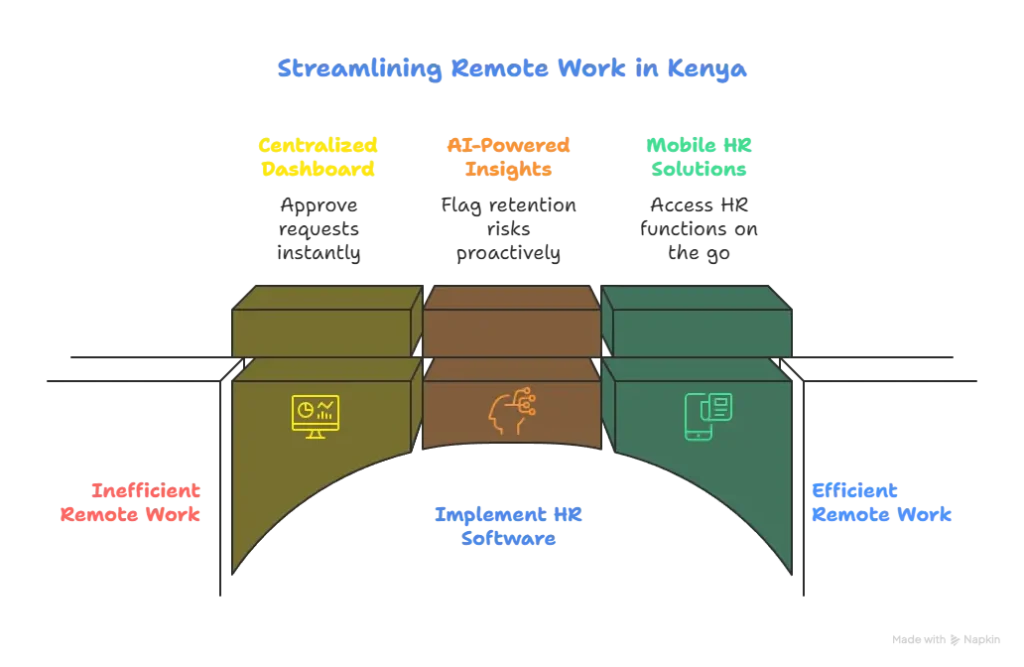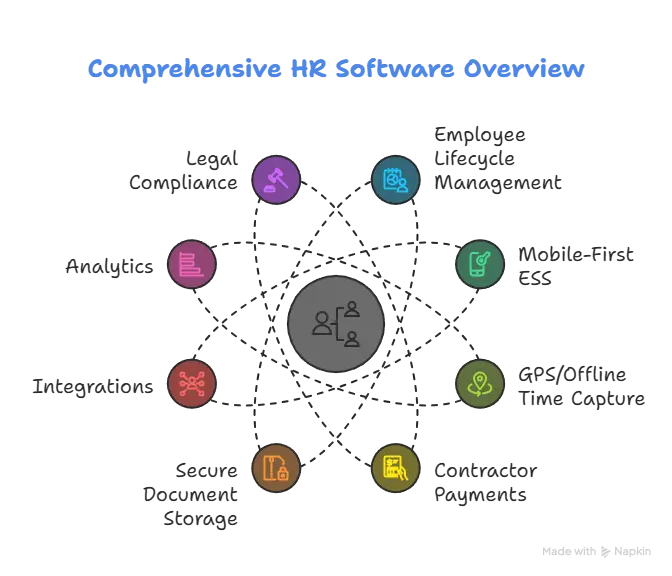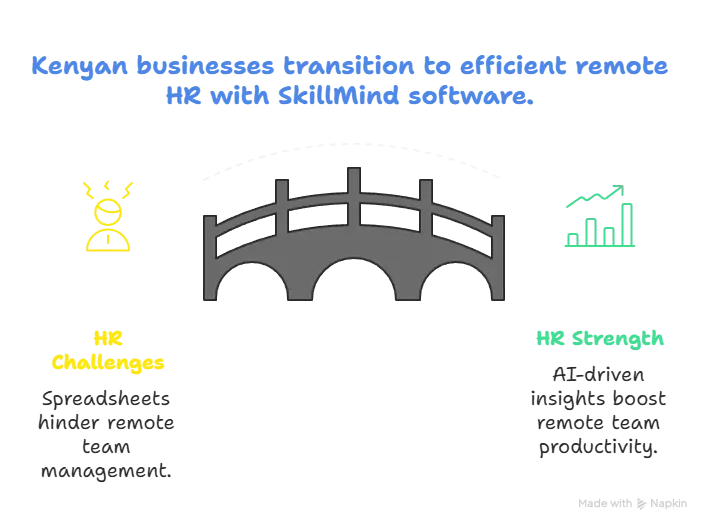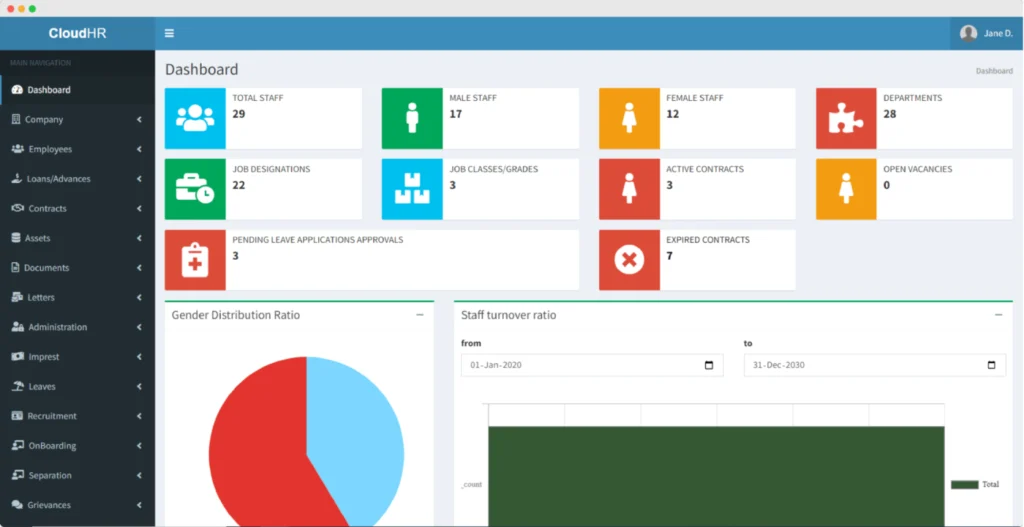Remote work is increasingly gaining traction and adoption by Kenyan companies and with this adoption, work processes need to be streamlined for efficient and effective running. You might be wondering then, as an HR practitioner or business owner, what is the best way to streamline my work processes to ensure the smooth running of my team working remotely here in Kenya?? Allow us to paint a picture for you.
Imagine logging into your HR dashboard from a bustling café in Nairobi, instantly approving a leave request from a team member in Mombasa. At the same time, AI flags a potential retention risk for your remote developer in Kisumu, all before your morning Java Chai Latte cools. This isn’t a distant future; it’s the reality for Kenyan businesses embracing the best HR software for remote teams. As Kenya’s digital economy surges, with 30% of SMEs adopting hybrid models and remote work boosting productivity by 13% as noted in the Stanford study. Choosing the right HR software isn’t just smart; it’s essential for staying competitive in 2025. But with options flooding the market, how do you find the best HR software Kenya has to offer? This guide dives deep into what makes HR software ideal for remote teams, why it’s a game-changer, how to select one, where it fits in Kenyan workplaces and why SkillMind Software Ltd is the right answer to your questions. Whether you’re an SME owner grappling with distributed teams or an HR manager seeking mobile HR software Kenya solutions, we’ll help you navigate the choices to build a resilient, efficient workforce.

Why Remote and Hybrid Work in Kenya Demand Smarter HR Software
Remote and hybrid work are reshaping Kenya’s labour market. The ICT sector leads hybrid adoption, with over 30% working in hybrid roles as infrastructure and connectivity improve.
The online gig economy in Kenya has been estimated at roughly $109 million (2019 estimate) reported by Mercy Corps, employing tens of thousands and steadily growing, a sign that many businesses now manage a mix of full-time, part-time and gig workers.
National statistics show that informal work still dominates job creation: recent reports indicate 90% of new jobs are informal, making structured HR processes critical to formalise and protect remote and gig workers.
Global studies also show remote work can improve productivity (the well-known Ctrip/Stanford finding of around 13% productivity gain is often cited), but gains only follow when organisations have systems that support remote operations; time tracking, performance measurement and secure data practices.
Takeaway: Kenya’s remote-ready workforce, together with the large informal/gig segment, equates to an urgent need for HR software that handles compliance, attendance, payroll and remote engagement.
What HR Software for Remote Teams in Kenya Really Means
HR software is a cloud platform that centralises the employee lifecycle: hiring, onboarding, attendance, payroll, performance, offboarding and adds features essential for distributed workforces: mobile-first employee self-service (ESS), GPS/offline time capture, contractor payments, secure document storage, integrations (accounting, bank APIs, collaboration tools) and analytics. For Kenya, legal compliance with local laws like the Employment Act and Data Protection Act 2019 and statutory deductions like PAYE, NSSF, NHIF/SHIF and Housing Levy are mandatory features.
Platforms like SkillMind’s HR Genie exemplify this, with mobile HR software features that support 80% mobile searches in Kenya, ensuring remote workers from anywhere can access services without high-bandwidth needs.

Key HR Challenges for Remote Teams in Kenya and How to Measure Success
From our research, operational risks that an HR system must fix are as follows:
- Attendance accuracy: Ghost hours, lost timesheets and offline fieldwork.
- Payroll errors & compliance risk: Manual calculations expose firms to PAYE/NSSF/SHIF mistakes.
- Contractor management: Fragmented invoices, cross-border payments and tax classification.
- Employee experience: Slow approvals, missing pay slips and poor onboarding for remote hires.
- Data security & auditability: Scattered spreadsheets fail legal audits under the Data Protection Act.
What to measure: payroll accuracy rate, on-time pay slip delivery, time-clock compliance, contractor payout cycle time and employee Net Promoter Score (eNPS).
How to Choose the Best HR Software for Remote Teams in Kenya
Selecting the best HR software for remote teams in Kenya requires a structured approach, focusing on features that address local challenges like connectivity issues and compliance. Use this as your procurement filter:
- Local statutory compliance & updates: Does the vendor auto-update PAYE/NSSF/NHIF rules? (Must-have.)
- Time & attendance for distributed teams: GPS tagging, offline sync, biometric integration, mobile-first UX.
- Payroll & contractor payments: Multi-currency, contractor invoicing, bank payment rails.
- Security & data residency: Encryption, role-based access, audit logs, DP Act compliance.
- AI & analytics: Automated alerts (retention risk, overtime spikes), calibrated for local context.
- Integrations & API: Accounting, bank, ERP, Slack/Zoom.
- Support & onboarding: Local presence, SLA, training, legal advisory for contracts.
- Total cost of ownership: License + payroll runs + hardware + integrations.
Tip: SkillMind’s HR Genie meets all 8 of these benchmarks, from automated PAYE updates to offline-ready time tracking, making it a top choice for distributed teams in Kenya.
Case Study: How HR Software Helped a Kenyan Fintech Fix Payroll Chaos
A Nairobi fintech with 120 employees (40% remote) used spreadsheets for time capture. On payroll day, two remote teams’ timesheets were missing; payroll ran late, tax deductions were misapplied and senior engineers threatened to leave.
They piloted a HR stack: HR Genie, TimeTrax for GPS-based clock-ins and CloudWage for payroll reconciliation. The next month payroll closed on time, tax filings matched KRA expectations and turnover risk dropped. The HR manager said the switch paid for itself in two months via reduced overtime errors and fewer sticky escalations.
Why this matter: real pay/morale problems are solved by reliable attendance plus payroll integrations, not more meetings.
Local vs Global HR Software: Why Kenyan Businesses Benefit from Homegrown Solutions
Local advantage: Kenyan vendors (or global vendors with Kenyan ops) embed PAYE, NSSF, SHIF rules, local banking rails and respond faster to legislative updates. If most of your staff are Kenya-resident, a Kenyan-first solution usually lowers compliance risk and simplifies payroll.
When to pick global: If you have many cross-border full-time employees or want contractor payroll across 50+ countries, combine a local HR system for Kenyan employees with a global payroll/contractor platform for non-resident contractors. Global platforms excel at mass contractor payments and EOR services but may lack deep local statutory integrations.

Essential HR Software Features Remote Teams in Kenya Can’t Do Without
Can remote staff submit timesheets offline and sync later? Yes. Choose a solution with offline caching and automatic reconciliation. TimeTrax offers biometric/terminal integrations.
- Will payroll automatically handle PAYE/NSSF /SHIF? Only choose systems that maintain statutory tables centrally and update them when KRA/NSSF rules change. CloudWage advertises this capability.
- Can I pay contractors across borders without compliance risk? Use a combined approach: local payroll for Kenyan employees; a global contractor platform for cross-border contractors, but track and store contracts centrally for audit.
- How do I protect employee data under the Data Protection Act? Verify encryption at rest/in transit, role-based access controls and documented data processing agreements. Skilled vendors will provide Data Protection Act-compliant documentation.
FAQs: Choosing the Best HR Software for Remote Teams in Kenya
Q: What’s the best HR software for remote teams in Kenya?
It depends on your mix of employees vs contractors. For predominantly Kenya-resident employees, a local vendor like SkillMind (HR Genie, CloudWage and TimeTrax) is ideal for compliance and local support. For large international contractor rosters, combine local HR software with a global contractor payroll platform.
Q: Can HR software handle informal/gig workers?
Yes, choose software that supports contractor records, invoicing and flexible pay schedules. Centralised documentation helps formalise gig engagements.
Q: How fast can I implement a full HR stack?
Pilot timelines vary: expect 4–8 weeks for attendance plus payroll pilot (including data migration), longer for full HRIS rollouts with integrations.
Q: How to choose HR software for distributed teams in Kenya?
Prioritise scalability, integrations and local support. For the best HR software for distributed teams in Kenya in 2025, test for low-bandwidth compatibility and compliance with the Employment Act.
Your Turn: What’s Your Biggest Remote HR Challenge in Kenya? Managing remote teams isn’t one-size-fits-all; some companies struggle with payroll delays, others with attendance tracking, while some battle contractor payments or employee engagement.
Which of these challenges hits closest to home for your business? Share your experience or question in the comments below and our SkillMind HR experts will send you a tailored checklist to help you optimise your remote HR setup in 2025.
Ready to Simplify HR for Your Remote Teams in Kenya?

Choosing the best HR software for remote teams in Kenya means investing in tools that bridge geographical gaps, ensure compliance, and foster productivity in 2025’s dynamic landscape. From mobile access to AI-driven insights, the right software transforms HR from a challenge into a strength for Kenyan businesses.
Ready to stop wrestling with spreadsheets and start managing remote teams like a pro?
Book a free demo of SkillMind’s HR Genie, TimeTrax and CloudWage and get a custom remote-team readiness assessment.

















